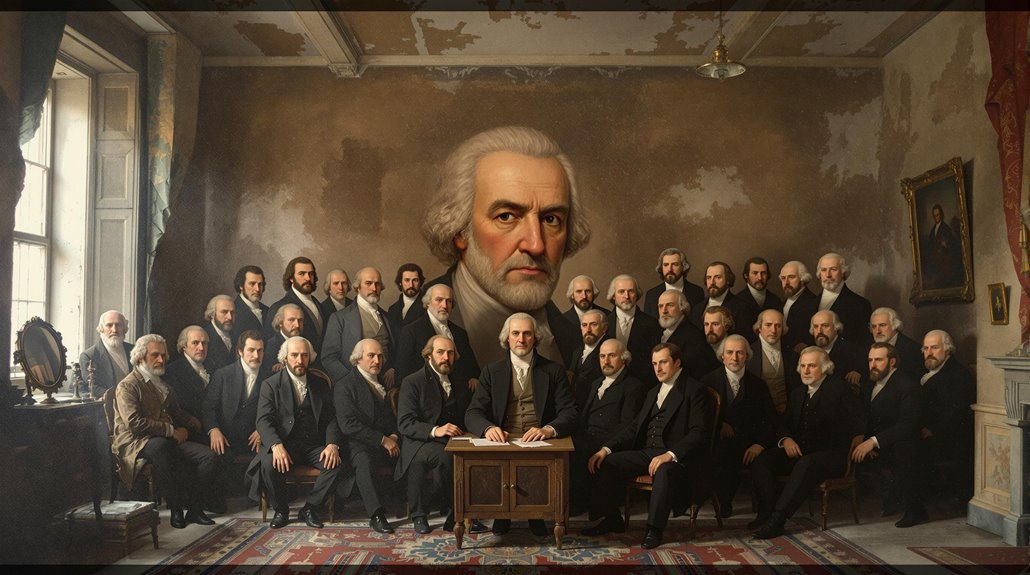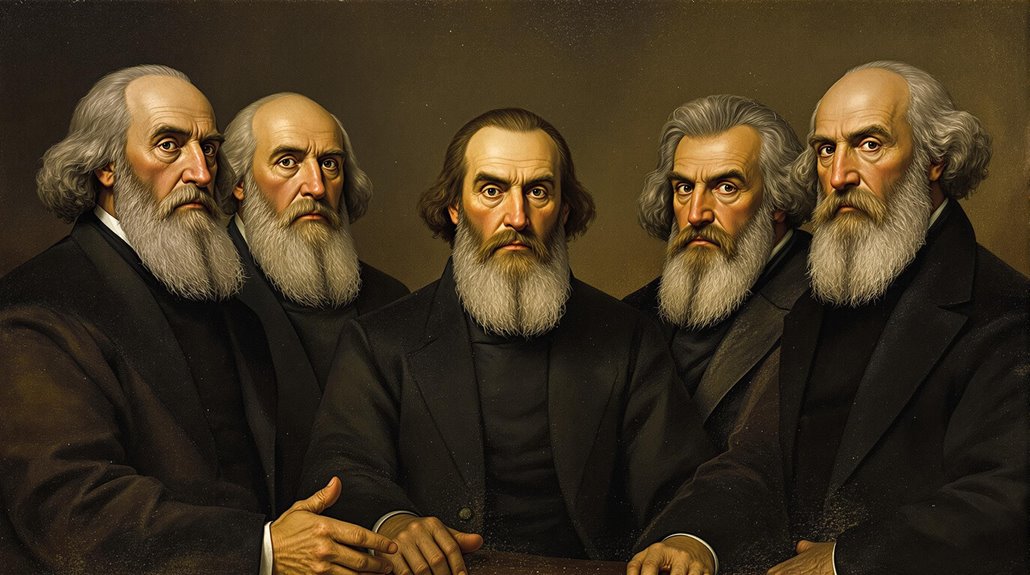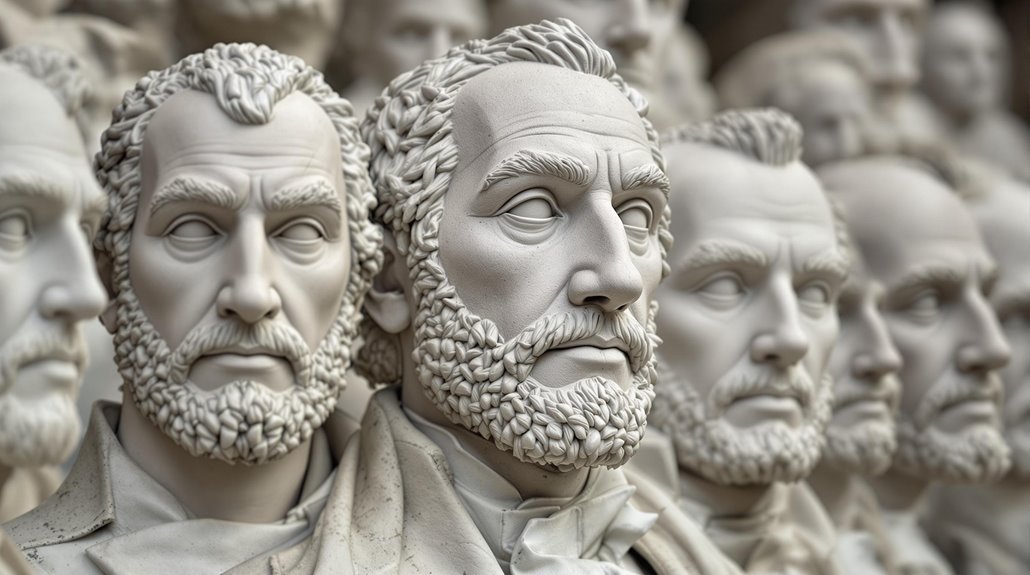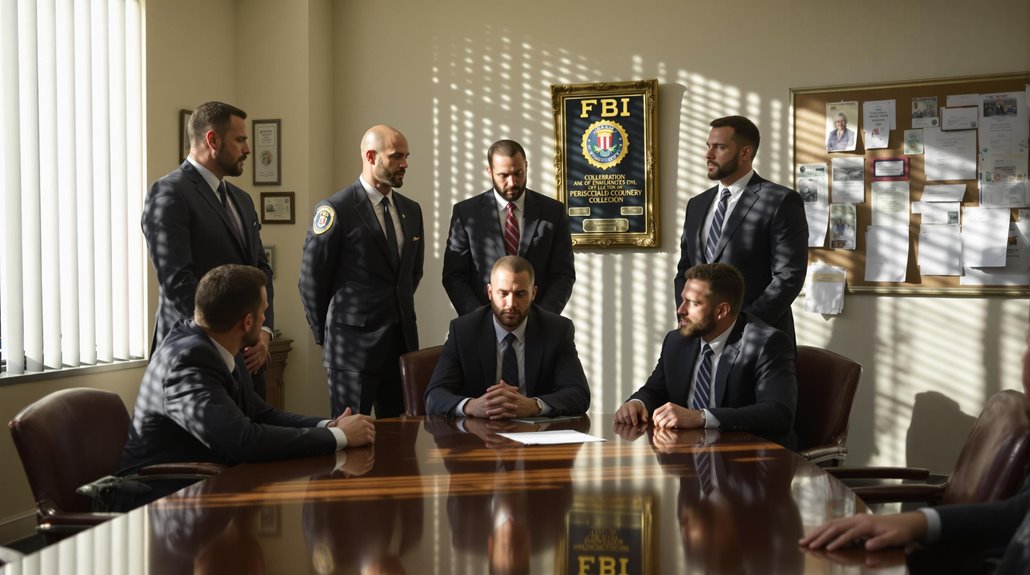Why Did None of the Founding Fathers Have Beards?

The reason none of the Founding Fathers had beards is largely due to the grooming norms of the 18th century. At that time, politeness and social status were identified with clean-shaven faces, aligning with broader Enlightenment principles. Sporting a beard was considered outdated, even regressive. In addition, beards carried stigma, implying lower social standing. The Founding Fathers, wishing to symbolize openness and rationality, stuck to the fashion of the day: the clean-shaven look. It's fascinating how whiskers and world views can intertwine, isn't it? There's much more to this hairy history if you're curious.
The 18th Century Beard Fashion
Ever wondered why all the Founding Fathers were clean-shaven? In the 18th century, societal norms and fashion dictated a clean-shaven look. Cultural politeness and aesthetics favored a smooth face, something that was widely accepted and practiced across Western civilization. This trend wasn't just a random preference but a reflection of the prevailing societal norms.
The clean-shaven fashion of the 18th century was so prevalent that orders for soldiers during the American Revolution often mandated neat grooming, further reinforcing this norm among the military and public figures. Significantly, Joseph Palmer faced persecution in the 1830s simply for sporting a long beard, an indication of the public's deep mistrust and negative perceptions surrounding facial hair.
Influences from European royalty, like Peter the Great's beard tax, propagated the trend of shaving among the elite. By aligning themselves with this trend, the Founding Fathers, consciously or not, were echoing societal norms that associated beards with a lack of sophistication and cleanliness. So, the next time you see a portrait of a Founding Father, remember - their clean-shaven look was more than just a fashion statement, it was a reflection of the times.
Facial Hair and Enlightenment Ideals
In the grand scheme of things, the founding fathers' clean-shaven faces were a lot more than a fashion choice. Their smooth visages reflected Enlightenment ideals, symbolizing rationality, openness, and civility in the new democratic society they were forging. Those ideals weren't just abstract notions; they were embodied in the cultural values of their time, becoming tangible in their physical appearances.
Being clean-shaven was synonymous with modernity and progress. It was a visual representation of their clarity of thought and approachability in leadership, setting the founding fathers apart from the bearded figures of older, more traditional societies. They sought to distance themselves from these societies, choosing instead to align with contemporary European styles.
Facial hair, or rather the lack of it, also carried significant weight concerning respectability. The 18th-century American aesthetic standards considered beards outdated and linked them to a past they wanted to leave behind. By choosing to remain clean-shaven, the founding fathers adhered to these standards, enhancing their public image and reaffirming their commitment to Enlightenment principles, individualism, and the birth of a new American identity.
The Societal Stigma Against Beards

You might find it surprising, but the societal stigma against beards in 18th century America was deeply ingrained. This was due in large part to cultural norms that leaned heavily towards clean-shaven faces. A smooth face was perceived as aesthetically pleasing and polite. It was a visual statement, signaling alignment with Enlightenment ideals of openness and rationality.
The military grooming standards of the time also played a significant role in reinforcing this stigma. Soldiers were typically ordered to be clean-shaven, reflecting cleanliness and discipline. It wasn't just a preference, but rather, a mandate that seeped into broader societal expectations.
Furthermore, European fashions strongly influenced American styles. Figures like Peter the Great, who popularized a clean-shaven look, further entrenched this societal stigma against beards. Negative perceptions around facial hair were so pervasive that they even led to harassment and imprisonment, as exemplified by Joseph Palmer's experience in the 1830s.
Joseph Palmer: A Bearded Martyr
Defying societal norms of the 1830s, Joseph Palmer stood out as a man unafraid to wear his beard long. He wasn't just bearded; he was a symbol of personal expression in a time of rigid expectations. His facial hair, while a simple personal choice, became a controversial statement that was met with violent opposition. Four men attacked him, set on removing what they saw as an affront to societal norms.
Palmer fought back, and in an ironic twist, was arrested and fined for unprovoked assault. His refusal to pay the fine led to his imprisonment, further highlighting the prevalent anti-beard sentiment. This wasn't just about facial hair—it was about freedom of expression and the price one pays for going against the grain.
Persecuted for his beard, Palmer became a martyr for his cause. His bold stance against societal norms is immortalized on his tombstone: "Persecuted for wearing the beard." His story is a stark reminder of why none of the founding fathers sported beards. They lived in a time when a beard could cost you your freedom.
The Civil War and Beard Popularity
A shift in cultural norms during the Civil War timeframe changed society's perception of beards. You see, in contrast to the founding fathers, who saw clean-shaven faces as a standard of sophistication and authority, the civil war period welcomed beards as symbols of masculinity and strength. Soldiers and commanders sported beards, differentiating them from women and representing virility.
Prominent military figures like Ulysses S. Grant and Robert E. Lee proudly wore facial hair, pushing its popularity during and after the conflict. This trend continued post-Civil War, influencing societal values and perceptions of leadership. Beards signified independence and ruggedness during this transformative timeframe, reflecting a shift in societal values towards masculinity and authority.
Abraham Lincoln: A Bearded President
Breaking with tradition, Abraham Lincoln became the initial U.S. president to grow a beard in 1861. His decision, spurred by the suggestion of a young admirer, Grace Bedell, marked a shift in presidential appearance. Until then, facial hair was a rarity in the White House.
Abraham Lincoln's beard, more than a fashion statement, was a symbol of strength and masculinity during the Civil War. It became an integral part of his political image, one that resonated with the public in a time of national crisis. You can visualize Lincoln, his face framed by that iconic beard, leading the nation through one of its darkest periods.
And Lincoln wasn't the only bearded president. His choice inspired a trend that saw figures like Ulysses S. Grant follow suit. These beards shaped public perceptions, intertwining masculinity with political leadership.
The Decline of Beards in Politics
While Abraham Lincoln and his successors accepted beards, marking a period of hairy-chinned leadership, this trend didn't last forever. By the early 20th century, beards started to retreat from American politics. The last president sporting facial hair was William Howard Taft, carrying the torch of facial masculinity until 1913.
As you explore American history, you'll see a significant shift in grooming norms. A sociological study, tracking facial hair trends from 1842 to 1972, found that by 1972, nearly all men had adopted clean-shaven looks. This mirrored societal expectations of professionalism and reflected a broader trend towards clean-shaven appearances in politics.
Beards, once seen as a sign of masculinity and authority, became associated with outdated notions of manhood. Practicality of grooming, hygiene concerns, and historical stereotypes linking beards to dirtiness didn't help either. These factors discouraged political candidates from growing facial hair. Today, fewer than 5% of Congress members sport beards or mustaches, a reflection of the decline of beards in politics.
Gender Dynamics and Facial Hair
Diving into the 18th century, you'll find that societal norms leaned heavily towards clean-shaven faces for men. Facial hair was perceived as less refined, challenging your masculinity rather than supporting it. Founding Fathers like George Washington and Thomas Jefferson, epitomes of the period's grooming standards, were clean-shaven, reflecting the societal norms of their time.
In this context, beards were subject to cultural mistrust, often associated with lower social status or effeminacy. This perspective starkly contrasted with the gender distinctions of the 19th century, where facial hair morphed into a symbol of masculinity.
Consider these three points:
- Facial hair was frowned upon in the 18th century, often linked to a lower social standing.
- Founding Fathers adhered to clean-shaven standards, reflecting the period's societal norms.
- The 19th century saw a shift, with beards symbolizing masculinity and authority.
Cultural Perceptions of Masculinity

It's significant to observe how the cultural perceptions of masculinity influenced grooming practices in the 18th century. You'd find that a clean-shaven face was the norm, largely due to cultural politeness. The Enlightenment ideals of the time valued aesthetics and rationality, further solidifying this grooming trend among men. Figures like George Washington and Thomas Jefferson weren't exceptions; they conformed to societal expectations, their clean-shaven appearances symbolizing openness and clear-thinking.
Modern Research on Political Beards
Nearly a century has passed since a U.S. president sported facial hair, reflecting an enduring trend towards clean-shaven politicians. This is not a coincidence. Modern research shows fascinating cultural shifts relating to beards and political representation.
- Perception of Trustworthiness: Voters often view clean-shaven politicians as more trustworthy and professional, influencing their voting rights. This perception contributes to the decline of the hirsute in politics.
- Cultural Shift: Sociologists tracking facial hair trends from 1842 to 1972 found that almost all politicians were clean-shaven by the end of that period. Today, less than 5% of Congress members have beards or mustaches. This signifies a significant cultural shift away from facial hair in politics.
- Competence and Bias: While beards were associated with masculinity and authority in the 19th century, modern research suggests they can both convey competence and power and lead to biases against candidates perceived as aggressive or close-minded.




